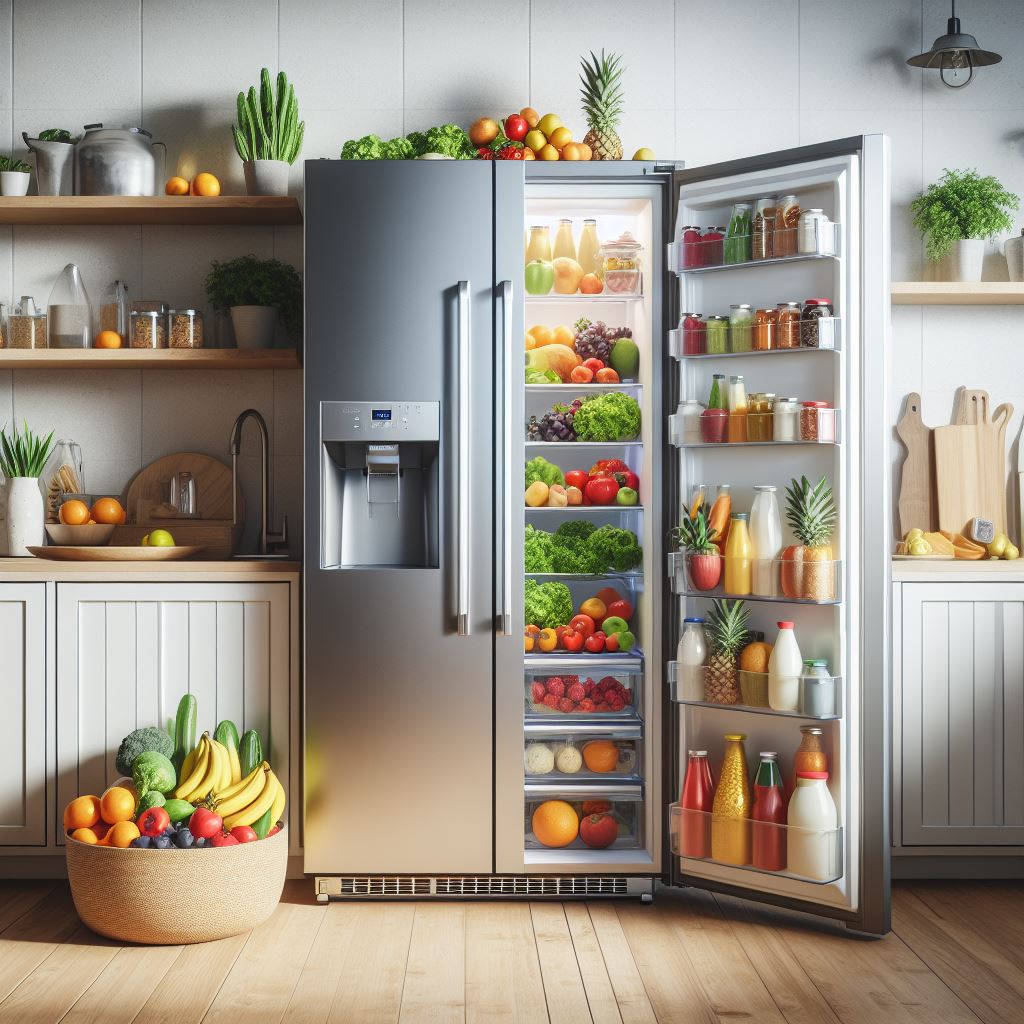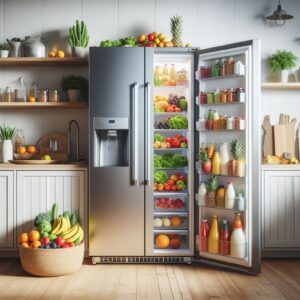The Role of MLCC in Modern Refrigerators

Refrigerators have become an indispensable part of our daily lives, keeping our food fresh and safe to consume. Behind the scenes, a crucial component contributes to their efficiency and performance: Multilayer Ceramic Capacitors (MLCCs).

MLCC Applications in Refrigerator Components
Refrigerators are complex appliances that rely on various components to function efficiently. Multilayer Ceramic Capacitors (MLCCs) are essential electronic components used in several key areas of a refrigerator, contributing to its performance and reliability.
Compressor
The compressor is a critical component that circulates refrigerant through the refrigerator’s cooling system. MLCCs are used in the compressor’s motor drive circuit to ensure smooth operation and energy efficiency. They help regulate the voltage and current, which is crucial for the compressor’s performance.
Temperature Control
MLCCs are used in temperature sensor circuits to provide accurate temperature readings inside the refrigerator. This information is essential for the refrigerator’s control system to maintain the desired temperature, ensuring food safety and energy efficiency.
Display Panels
Many modern refrigerators feature digital display panels that allow users to monitor and control the refrigerator’s settings. MLCCs are used in these display panels to filter and stabilize the power supply, ensuring reliable operation of the display.
Lighting
MLCCs are also used in the lighting circuits of refrigerators. They help regulate the voltage and current to the refrigerator’s lights, ensuring they operate efficiently and have a long lifespan.
Advancements in Refrigerator Technology Enabled by MLCCs
Refrigerators have come a long way from simple iceboxes to sophisticated appliances that offer advanced features and functionalities. One of the key drivers of these advancements is the use of Multilayer Ceramic Capacitors (MLCCs) in various aspects of refrigerator design.
Energy Efficiency
MLCCs have played a crucial role in improving the energy efficiency of refrigerators. By using MLCCs in the compressor’s motor drive circuit, manufacturers can achieve better control over the compressor’s operation, leading to lower energy consumption and reduced environmental impact.
Smart Connectivity
Modern refrigerators often come equipped with smart features that allow users to monitor and control them remotely. MLCCs are used in the electronic control units of these refrigerators, enabling seamless communication between the appliance and external devices such as smartphones and tablets.
Enhanced Cooling Performance
MLCCs contribute to the enhanced cooling performance of refrigerators by ensuring precise temperature control. By using MLCCs in temperature sensor circuits, manufacturers can achieve more accurate temperature readings, leading to better food preservation and energy efficiency.
Challenges and Solutions in Using MLCCs for Refrigerators
While Multilayer Ceramic Capacitors (MLCCs) offer many benefits for use in refrigerators, there are also challenges that manufacturers need to address. Understanding these challenges and finding effective solutions is crucial for ensuring the reliability and performance of refrigerators.
Temperature Sensitivity
One of the main challenges in using MLCCs for refrigerators is their sensitivity to temperature fluctuations. Refrigerators operate in a wide range of temperatures, and MLCCs need to maintain their performance and reliability across these variations.
Solution: Manufacturers can address this challenge by selecting MLCCs that are designed to withstand the temperature range of refrigerators. They can also implement temperature compensation techniques to ensure that the MLCCs perform consistently.
Reliability
Another challenge is ensuring the long-term reliability of MLCCs in refrigerators. MLCCs are subjected to various stresses, such as temperature changes, vibrations, and electrical loads, which can affect their performance over time.
Solution: Manufacturers can improve the reliability of MLCCs by using high-quality components and implementing robust design practices. They can also conduct rigorous testing to ensure that the MLCCs meet the required performance standards.
Supply Chain Constraints
The global supply chain for electronic components, including MLCCs, has faced challenges in recent years, leading to shortages and price fluctuations. This can impact the availability and cost of MLCCs for refrigerator manufacturers.
Solution: To mitigate supply chain constraints, manufacturers can work closely with suppliers to secure a stable supply of MLCCs. They can also explore alternative sourcing options and consider stockpiling critical components to ensure continuity of production.
Future Trends: The Impact of MLCC Technology on Refrigerators
As technology continues to advance, Multilayer Ceramic Capacitors (MLCCs) are expected to play an even more significant role in shaping the design and functionality of refrigerators. Here are some future trends that may emerge:
Increased Energy Efficiency
MLCCs will likely be used in more energy-efficient components of refrigerators, such as advanced compressor drive circuits and temperature control systems. This will help reduce energy consumption and operating costs for consumers.
Integration with IoT and Smart Features
Refrigerators will become more integrated with Internet of Things (IoT) technology, allowing for remote monitoring and control. MLCCs will play a crucial role in the electronic control units and communication modules that enable these smart features.
Miniaturization and Space Saving
Advancements in MLCC technology will lead to smaller and more compact components, allowing for the design of sleeker and more space-efficient refrigerators. This will be particularly beneficial for small kitchens and urban living spaces.
Enhanced Reliability and Durability
MLCCs will continue to improve in terms of reliability and durability, ensuring that refrigerators last longer and require fewer repairs. This will result in cost savings for consumers and reduced electronic waste.
Conclusion
The future of refrigerators looks promising with the continued advancement of MLCC technology. By leveraging MLCCs for increased energy efficiency, integration with IoT, miniaturization, and enhanced reliability, manufacturers can create refrigerators that are more efficient, convenient, and durable than ever before.
